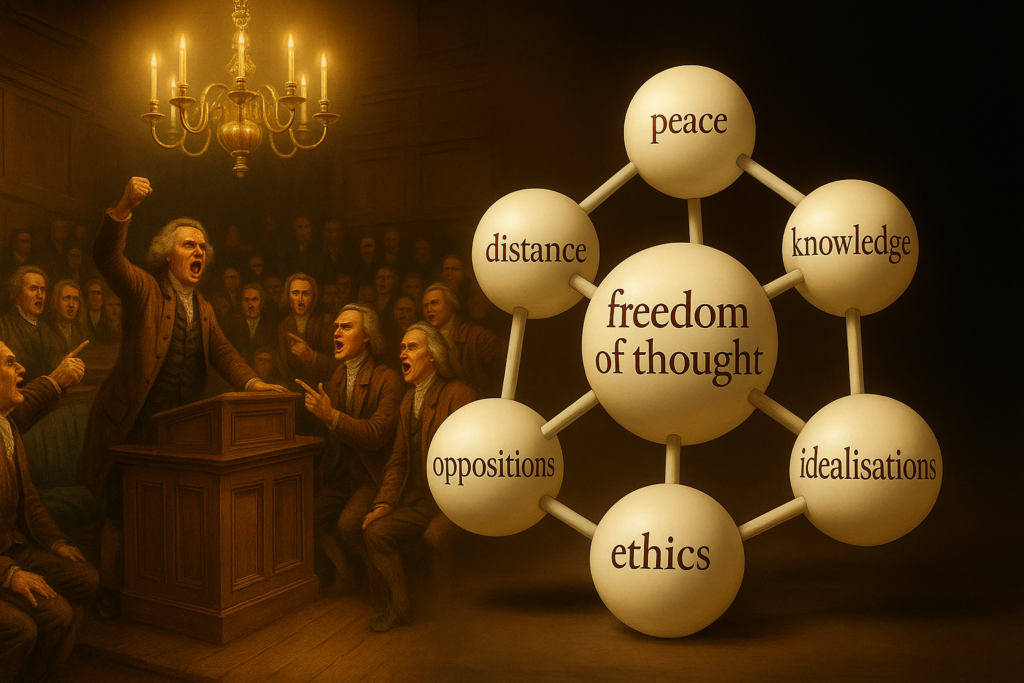
The questions that drive me
The philosophical reflection I pursue is neither a search for truths nor a hunt for ways to change a world riven by oppositions and idealisations. It rests on a way of life oriented towards freedom of thought, distance and peace.
An engineer by training, I work in IT and the supply-chain sector. For years I’ve observed the economic upheavals brought about by computerisation and automation: they force restructurings, reshape occupations and repeatedly push people out of work. Gross job losses and task substitution driven by AI, machines, and robots are a major 21st-century challenge, on a par with climate change. This has led me to take some distance from an economy—whatever its form, capitalist, communist, etc.—that was elevated in the 18th–19th centuries into the organising principle of society. In turn, that principle tends to fragment nations as well as international unions.
In this context, the place of the human being is once again in question—and, more broadly, the world shaped by our activities and our imaginaries. How have we come to live in societies where individual freedom, the ‘self’, wealth, work or competitiveness function as moral obligations and as criteria of political legitimacy? How do these demands come into tension with other aspirations—knowledge, freedom of thought, equality, peace? How do moral values diversify while at the same time solidifying into automatisms that are hard to question? These are the questions that guide my research.
My intellectual journey
My first question was freedom, the cardinal value of the West which, paradoxically, presents itself as an imperative even though the concept commands no consensus. In exploring it, I came to see that it emerges at the boundary between science and ethics: the former sets limits we do not transgress; the latter creates horizons among which we choose. Hence the science/ethics distinction that became central, and a long enquiry into the sciences—beginning with sociology, built on moral foundations.
Gradually, the conceptual arrangements stabilised, the question of truth clarified, and I realised that my philosophical motivation lay in ethics rather than epistemology. Why do we live as we do, isolated in our spheres, without an overall view? Why do we reproduce the same injustices and forms of violence? Why are individuals so unaware of the values that orient them? Why do our societies produce obligations they have not yet acknowledged as historical constructions?
To answer, tidying up concepts is not enough: we must study history—of events as much as of ideas. We must also take some distance from critique itself: blind critique projects onto reality the presuppositions it seeks to impose. Alongside freedom of thought and peace, I conceive distance as an orientation of life. It is not a withdrawal from the world, but a way of accepting it as it is, ruled by others, while continuing to think, to inquire and to make sense of it.
Distance takes time, but it need not mean silence. In parallel with in-depth reflections, the outcome of research and maturation, I also publish exploratory, spur-of-the-moment analyses, which allow me to voice intuitions and begin to give them structure. These most often appear as snapshots (short articles). The two rhythms of writing respond to each other and form part of the same reflective process.
A few years ago, I thought I could step into political debate and contribute to reducing oppositions. Today I judge that unrealistic: the world is drifting quickly, societies slip beyond the control of their leaders, and many prefer to ignore what unsettles them and live in imaginaries that fit their desires. This trend plays into the hands of an economy that is automating, making human beings increasingly superfluous across a growing range of tasks and activities.
On the automation of the economy, see my piece: How Technologies Are Eroding Creative Destruction
Being pessimistic about the decades ahead does not entail giving up. I no longer seek to “save the world”; I try to describe it honestly, at the scale at which it becomes intelligible—that is, the long historical scale. The understandings that emerge help me gain distance from problems—a distance that, in turn, brings a little peace in a turbulent time.
Latest series: the valorisation of the economy (15th–19th centuries)
I trace how work, trade, enrichment, industry or consumption were progressively elevated into social and political principles—means that turned into moral justifications.
Pathway: from the Italian merchant city-states to 17th–18th-century England, and on into the 19th century.
How to cite a publication? Example: Damien Gimenez, “Progress and Limits of Freedom of Thought in Europe from the 16th to the 18th Century,” accessed 26 March 2024, URL: <https://damiengimenez.fr/wpdgi_article_en/progress-and-limits-of-freedom-of-thought-in-europe-from-the-16th-to-the-18th-century/>.
Contact : damien[dot]gimenez[at]gmail.com
Translations are carried out with the help of ChatGPT.